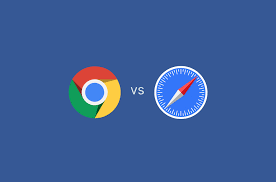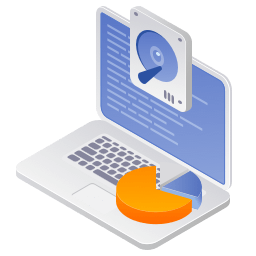PAGE CONTENT:
In the world of web browsing, two giants dominate the scene: Apple's Safari and Google's Chrome. Both browsers are popular among Mac users, but they cater to different preferences and needs. This article will explore their differences in user interface, performance, features, privacy, security, and integration with macOS, helping you decide which browser might be best for you.
Introduction of Safari and Chrome
Web browsers have become indispensable tools for navigating the internet. They enable us to access information, interact with online communities, and conduct business. With numerous options available, choosing the right browser can significantly enhance your online experience. Safari, the default browser on Mac, is designed to offer a seamless experience for Apple users, while Chrome, known for its speed and extensive customization options, appeals to a broader audience. This article aims to compare Safari and Chrome in various aspects, providing insights to help you make an informed choice.

🔖About Apple's Safari
Safari is Apple's native web browser, designed specifically for macOS and iOS devices. Renowned for its sleek, minimalist interface, Safari provides a user-friendly experience that emphasizes speed, efficiency, and privacy. With features like Intelligent Tracking Prevention and seamless integration with Apple's ecosystem - such as Handoff and iCloud Keychain - Safari caters to users who prioritize security and a cohesive browsing experience across multiple Apple devices. Its focus on performance and energy efficiency also makes it an excellent choice for Mac users, particularly those using laptops who want to maximize battery life.
🔖About Google's Chrome
Google Chrome is a cross-platform web browser celebrated for its speed, versatility, and extensive customization options. Initially launched in 2008, Chrome has rapidly gained popularity due to its robust performance and vast library of extensions available through the Chrome Web Store. With a straightforward interface and deep integration with Google services, such as Google Drive and Gmail, Chrome appeals to users who value flexibility and productivity. Its regular updates and advanced security features make it a reliable choice for both casual and power users, though its higher resource consumption can be a consideration for those using less powerful devices.
Safari vs. Chrome: Which Is Your Mac's Ideal Web Browser?
🔖User Interface and Design
| Safari's Design and Aesthetics | Chrome's Design and Customization Options | User Experience and Intuitiveness |
| Safari boasts a clean and minimalist design, emphasizing simplicity and ease of use. The browser's address bar integrates search and URL input, which minimizes clutter and allows users to focus on the content. Safari uses a tabbed browsing system that is visually appealing, with tabs placed at the top of the window and rounded edges for a softer look. The overall aesthetic aligns with Apple's design philosophy, featuring smooth animations and transitions that enhance the user experience. Safari's dark mode option also provides a visually cohesive experience for users who prefer a darker interface, making it comfortable for extended browsing sessions. |
Chrome, on the other hand, takes a more utilitarian approach to design. Its interface is straightforward and functional, with a prominent address bar that allows for quick access to search and navigation. Chrome’s tab management is effective, allowing users to pin tabs and organize them easily, but it can become cluttered with multiple open tabs. One of Chrome’s significant advantages is its customization capabilities. Users can personalize their browser experience with a vast library of themes and extensions available in the Chrome Web Store. This level of customization allows users to tailor the browser to their preferences, but it can also lead to a less cohesive visual experience compared to Safari. |
Both browsers offer intuitive user experiences, but Safari’s design is generally considered more user-friendly, especially for those already embedded in the Apple ecosystem. The seamless integration with macOS features, such as Handoff and iCloud Keychain, enhances the overall usability of Safari. Chrome, while slightly less intuitive for new users, offers a wealth of extensions that can significantly enhance functionality. Users comfortable with technology may find Chrome's flexibility and extensive features appealing, but the learning curve can be steeper for less experienced users. |
🔖Performance
| Speed Comparisons: Loading Times and Responsiveness | Resource Usage: RAM and CPU Consumption | Performance in Handling Multiple Tabs and Heavy Websites |
| When it comes to speed, both Safari and Chrome have their strengths. Safari is known for its fast-loading times and efficient performance, particularly on Mac devices. Apple has optimized Safari to work seamlessly with macOS, ensuring that users experience quick page loads and smooth scrolling. Chrome, while also fast, has been criticized for its resource consumption. The browser can become sluggish, especially when multiple tabs are open or when running resource-intensive web applications. However, Google has made significant improvements in recent years to enhance Chrome's speed, including reducing memory usage and optimizing loading times. |
One of the key differences between Safari and Chrome is their resource usage. Safari is generally more efficient in its use of RAM and CPU resources, which is especially noticeable when using multiple tabs. This efficiency contributes to longer battery life on Mac laptops, making Safari a better choice for users who prioritize battery performance. In contrast, Chrome is known for its high memory consumption. Each tab and extension runs in its process, which enhances stability but can lead to increased RAM usage. Users with limited system resources may experience slowdowns or crashes when using Chrome, particularly with many tabs open. |
Both browsers handle multiple tabs well, but Safari often maintains better performance under heavy workloads. Users who regularly multitask with several tabs open may find Safari's performance more stable and reliable. Chrome, while capable of managing multiple tabs, may slow down when too many are open or when accessing resource-heavy websites. However, the browser's capability to run web applications efficiently is a significant advantage for users who rely on web-based tools. |
🔖Features
Key Features of Safari:
Safari offers several unique features that enhance the browsing experience:
- 1. Privacy Report: Safari's Privacy Report provides insights into trackers that have been blocked, giving users a clearer understanding of their online privacy.
- 2. Reader Mode: This feature simplifies web pages by removing ads and distractions, making it easier to read articles and long content.
- 3. Handoff: For users with multiple Apple devices, Handoff allows seamless transitions between devices. Start reading a webpage on your Mac, and pick up where you left off on your iPhone or iPad.
- 4. iCloud Keychain: Safari's integration with iCloud Keychain simplifies password management, securely storing and autofilling passwords across devices.
- 5. Extensions: While Safari's extension library is not as extensive as Chrome's, recent updates have significantly expanded its offerings, allowing users to customize their browsing experience.
Key Features of Chrome:
Chrome stands out with a range of features that appeal to power users:
- 1. Extensive Extension Library: Chrome's Web Store offers thousands of extensions, enhancing functionality and allowing users to customize their browsing experience significantly.
- 2. Built-in Google Services: Chrome integrates seamlessly with Google services, such as Google Drive, Docs, and Gmail, making it a preferred choice for users heavily invested in the Google ecosystem.
- 3. Incognito Mode: Chrome's Incognito Mode allows users to browse the web without saving history, cookies, or site data, providing a level of privacy while surfing.
- 4. Synchronization: Chrome syncs bookmarks, passwords, and settings across devices, allowing users to access their preferences regardless of the device being used.
- 5. Advanced Developer Tools: Chrome's robust set of developer tools makes it a favorite among web developers for testing and debugging websites.
Unique Tools and Functionalities:
Both browsers offer unique tools that cater to different user needs. Safari’s privacy-focused features resonate with users who prioritize online security, while Chrome’s extensive customization options attract users who enjoy personalizing their browsing experience.
🔖Privacy and Security
Safari's Privacy Features:
Safari places a strong emphasis on user privacy. Its Intelligent Tracking Prevention feature limits the ability of websites to track user behavior across the web, enhancing privacy without sacrificing functionality. Additionally, Safari provides users with a clear view of how many trackers have been blocked, helping users stay informed about their online privacy.
Chrome's Security Measures:
Chrome has a reputation for being a secure browser, regularly updating to address security vulnerabilities. It includes features such as Safe Browsing, which warns users about potentially harmful sites, and sandboxing, which isolates processes to prevent malware from affecting the system. However, Google’s data collection practices have raised concerns about user privacy, leading some to question the trade-off between security and privacy.
Comparison of Data Handling:
When it comes to data handling, Safari takes a more conservative approach, prioritizing user privacy. Chrome, while secure, collects user data to enhance its services, leading to a more personalized browsing experience but at the cost of potential privacy concerns. Users who prioritize privacy may lean towards Safari, while those who value extensive features and integrations may prefer Chrome.
🔖Extensions and Customization
Availability and Variety of Extensions in Chrome:
Chrome's extension library is one of its standout features, with thousands of options available to enhance functionality. Users can find extensions for almost any purpose, from ad blockers to productivity tools. This extensive library allows for significant customization, enabling users to tailor their browsing experience to fit their specific needs.
Safari's Extension Ecosystem:
While Safari's extension ecosystem has historically been less robust than Chrome's, Apple has made strides to improve this area. Recent updates have introduced new extensions and improved support for existing ones, allowing users to customize their experience more effectively. However, the selection still lags behind Chrome’s offerings.
Impact of Customization on User Experience:
The ability to customize is crucial for many users. Chrome's extensive options allow for a high degree of personalization, but this can also lead to a cluttered browsing experience. Safari's more limited but cohesive selection of extensions provides a streamlined user experience, appealing to those who prefer simplicity over customization.
🔖Integration with macOS
Safari's Seamless Integration:
Safari is deeply integrated into macOS, providing a user experience that feels cohesive and natural for Apple users. Features like Handoff, which allows users to transition between devices effortlessly, and iCloud Keychain for password management enhance the usability of Safari for those who use multiple Apple devices. This integration ensures that users can access their information and preferences across devices seamlessly.
Chrome's Compatibility with Google Services:
While Chrome may not integrate as seamlessly with macOS as Safari, its compatibility with Google services is a significant advantage for users who rely heavily on these tools. Chrome syncs bookmarks, passwords, and preferences across devices, ensuring that users have a consistent experience whether they are on a Mac, Windows PC, or mobile device.
User Productivity:
For productivity-focused users, the choice between Safari and Chrome often comes down to the tools and services they use most frequently. Users embedded in the Apple ecosystem may find Safari more convenient, while those who rely on Google services may prefer Chrome for its seamless integration.
Conclusion
In conclusion, both Safari and Chrome offer unique advantages and features that cater to different user preferences. Safari excels in privacy, resource efficiency, and seamless integration with macOS, making it an excellent choice for users who prioritize these aspects. Chrome, with its extensive customization options, robust extension library, and integration with Google services, appeals to power users who value flexibility and functionality.
When choosing between Safari and Chrome, consider your browsing habits, priorities, and the ecosystem you are most invested in. If you prioritize privacy and a cohesive experience with your Apple devices, Safari is likely the better choice. On the other hand, if you value customization, extensive features, and integration with Google services, Chrome may be the right fit for you.
Ultimately, both browsers are powerful tools that can enhance your online experience. Trying each browser and exploring their features will help you determine which one aligns best with your needs. The choice is yours, but understanding the strengths and weaknesses of Safari and Chrome will empower you to make an informed decision.
Related Articles
- Nov 13, 2024Apple M3 Chip vs. M4 Chip: A Comprehensive Comparison
- Jan 06, 2025ExFAT vs FAT32 vs NTFS: What Are the Differences
- Dec 09, 2024How to Use a Digital Camera on Mac: A Comprehensive Guide?
- Jan 21, 2025HDD vs. SSD: A Detailed Comparison
- Jun 13, 2025macOS Tahoe 26: Everything You Should Know and Install it
- May 26, 2024How to Add Pictures for Mac Background?

Coco Lin
Coco has been a writer and a chief programmer at Donemax software since 2018. Over 10 years of experience of writing troubleshooting articles in the software industry, she is passionate about programming and loves to providing solutions to Windows and Mac users. Also she enjoys music and palying tennis in her free time.

Gerhard Chou
In order to effectively solve the problems for our customers, every article and troubleshooting solution published on our website has been strictly tested and practiced. Our editors love researching and using computers and testing software, and are willing to help computer users with their problems
Hot Donemax Products

Clone hard drive with advanced clone technology or create bootable clone for Windows/Mac OS.

Completely and easily recover deleted, formatted, hidden or lost files from hard drive and external storage device.

Certified data erasure software - permanently erase data before selling or donating your disk or any digital device.
